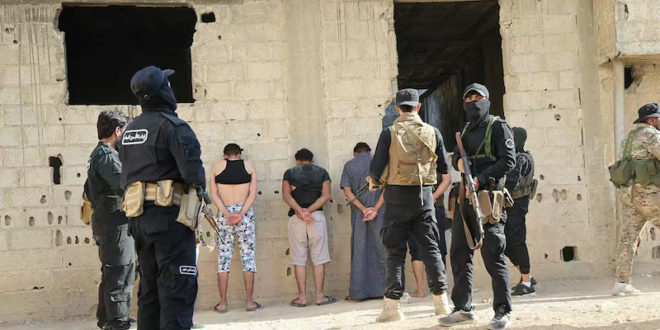Saraya Ansar al-Sunnah, a newly formed radical group, has claimed responsibility for the deadly church bombing in Damascus.
A new militant group which expressed affinity with ISIS has claimed responsibility for the suicide bombing at a church in Damascus on Sunday.
Experts say hardline Saraya Ansar Al Sunnah is made up in part of former Hayat Tahrir Al Sham members who grew disaffected with the group’s moderate rule once in government.
The new group said it carried out the attack at the Syriac Orthodox Mar Elias Church in response to “provocations” by the Christians of Damascus.
The shooting and suicide bombing left 25 people dead in the low-income district of Dweila, outside the walls of Old Damascus. The Syriac Orthodox church is the largest Christian denomination in Syria.
It was one of the deadliest attacks on civilians since the ousting of Mr Al Assad in December.
The government announced that security forces killed two members of an ISIS-linked terrorist cell and arrested six others in connection with the deadly attack.
HTS was affiliated with Al Qaeda until 2014. It is opposed to ISIS and has fought it in the last 10 years.
Saraya Ansar Al Sunnah is a splinter group of HTS, Aaron Zelin, a fellow at the Washington Institute, told The National.
“Saraya Ansar Al Sunnah are defectors from HTS – a splinter group. They left because they view the new government as a group of apostates who, in their view, do not follow Islamic law,” Mr Zelin said.
He said the group was involved in a number of assassinations, particularly against members of the Alawite sect to which the former president belongs.
“They were responsible of violence in Aleppo, Homs, Hama, Latakia, some of it related to the assassination of former Assad regime people.”
Saraya Ansar al Sunnah has no formal ties to ISIS, but its ideology closely aligns with the group’s extremist beliefs, and it may be operating as a front organisation for ISIS, according to Mr Zelin.
Combating ISIS is crucial for Syria’s new government to garner US support, especially after a breakthrough meeting last month between US President Donald Trump and Syrian President Ahmad Al Shara, who is also the leader of HTS. Mr Trump said the US would lift sanctions against Syria to help usher in stability under the new authorities in Damascus.
“The question now is whether this was a one-off event, now that the government realises this is a serious threat, not just individuals spouting off online or carrying out small-scale attacks. Or if it could evolve into a broader issue,” said Mr Zelin.
Search for accountability
Saraya Ansar al Sunnah also claimed responsibility for a massacre in the Alawite village of Arzeh in February, where 10 civilians were reportedly killed by unidentified gunmen, according to the Syrian Observatory for Human Rights.
A month later, another massacre took place in the same village, when men from neighbouring Sunni communities rampaged through Arzeh, killing 25 people as part of a spree of revenge killings against Alawites. Hundreds of civilians and unarmed individuals were killed in the violence.
President Al Shara called for the formation of an investigative committee following the massacres, but victims have complained of delays in accountability.
The attack poses yet another challenge for the new authorities in their efforts to contain simmering sectarian tensions in a country deeply fractured by 14 years of civil war.
“There are broader societal issues at play that go beyond the specifics of this attack,” said Mr Zelin.
“That’s why the government needs to take more seriously matters related to transitional justice, truth and reconciliation, and similar efforts to rebuild trust within communities across the country,” he added.
’Destabilising‘ Syria
Syria’s Interior Ministry said the raid by its security forces on the terrorist cell in the Western Ghouta suburbs of Damascus on Monday was the “beginning of a thread” that will unravel how the suicide attack was carried out.
The Ministry said one of the alleged militants killed had enabled the suicide bomber’s entry into the church, while the other “was planning another terrorist action in a neighbourhood of the capital”.
Explosives were seized, including a booby-trapped motorcycle, it said.
“In co-ordination with the General Intelligence Service, the Ministry carried out security operations against ISIS-linked terrorist cells in the Damascus countryside, arresting a cell leader and five members, and killing two others affiliated with the terrorist attack on Mar Elias Church in Damascus,” the Syrian Interior Ministry said on Monday.
Syriac Orthodox Patriarch Yohanna X ordered a ban on all outdoor gatherings of the community after a meeting with senior security officials on Monday, a member of the clergy told The National.
“The intention is for the restrictions to be temporary,” the clergyman said.
The security officials told the Patriarch that the raid by its security forces would help to prevent another attack but also pointed out that he had declined an offer of protection for churches from the authorities earlier this year, he said.
Instead, many churches mobilised a protection force of young volunteers who sometimes carried walkie-talkies approved by the state to liaise with police in case of threats. The offer for protection was not renewed at the meeting, the source said.
Last month, Syrian security troops conducted operations to expel ISIS from urban centres, killing three alleged members in Aleppo.
Christians, who make up five per cent of Syria’s population, have been politically important for Mr Al Shara, to the point that they were the focus of an invitation for two Republican members of the US House of Representatives to visit Syria in April.
 Eurasia Press & News
Eurasia Press & News




